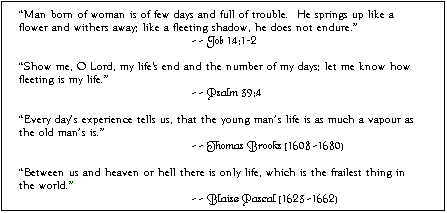

[Here we continue our reprint of Chapter 2 from Richard Baxter's classic tome A Christian Directory.11 This chapter consists of twenty directions to (as Mr. Baxter says) "young Christians or beginners in religion, for their establishment and safe proceeding." Though these studies were written specifically for "young" Christians, I think that you will find (as I have), there is much in here worthy of meditation also for those who have been walking with God for many years.]--Ed.
Direction XIX - On the Awareness of Life's Frailty
Promise not yourselves long life, or prosperity and great matters in the world, lest it entangle your hearts with transitory things, and engage you in ambitious or covetous designs, and steal away your hearts from God, and destroy all your serious apprehensions of eternity.
Our own experience, and the alterations which the approach of death makes upon the most, doth sensibly prove that the expectation of a speedy change, and reckoning upon a short life, doth greatly help us in all our preparation, and in all the work of holiness through our lives. Come to a man that lieth on his death-bed, or a prisoner that is to die tomorrow, and try him with discourse of riches, or honours, temptations to lust, or drunkenness, or excess, and he will think you are mad, or very impertinent to tell him of such things. If he be but a man of common reason, you shall see that he will more easily vilify such temptations than any religion persons will do in their prosperity and health. Oh how serious are we in repenting and perusing our former lives, and casting up our accounts, and asking what we shall do to be saved, when we see that death is indeed at hand and time is at an end, and we must away! Every sentence of Scripture hath then some life and power in it; every word of exhortation is savoury to us; every reproof of our negligence and sin is then well taken; every thought of sin, or Christ, or grace, or eternity, goes then to the quick. Then time seems precious; and if you ask a man whether it be better spent in cards and dice, and plays and feastings, and needless recreations and idleness, or in prayer, and holy conference, and reading and meditating on the word of God and the life to come, and the holy use of our lawful labours: how easily will he be satisfied of the truth, and confute the cavils of voluptuous time-wasters! Then his judgment will more easily be in the right, than learning or arguments before could make it. In a word, the expectation of the speedy approach of the soul into the presence of the eternal God, and of our entering into an unchangeable, endless life of joy or torment, hath so much in it to awaken all the powers of the soul, that if ever we will be serious, it will make us serious in every thought, and speech, and duty. And therefore, as it is a great mercy of God that this life, which is so short, should be as uncertain, and that frequent dangers and sicknesses call to us to look about us and be ready for our change, so usually the sickly, that look for death, are most considerate; and it is a great part of the duty of those that are in youth and health to consider their frailty, and the shortness and uncertainty of their lives, and always live as those that wait for the coming of their Lord. And we have great reason for it when we are certain it will be ere long; and when we have so many perils and weaknesses to warn us, and when we are never sure to see another hour, and when time is so swift, so quickly gone, so unrecoverable, and nothing when it is past. Common reason requireth such to live in a constant readiness to die.
But if youth or health do once make you reckon of living long, and make you put away the day of your departure as if it were far off, this will do much to deceive and dull the best, and take away the power of every truth, and the life of every good thought and duty, and all will be apt to dwindle into customariness and form. You will hardly keep the faculties of the soul awake, if you do not still think of death and judgment as near at hand. The greatest certainty of the greatest change, and the greatest joy or misery forever, will not keep our stupid hearts awake, unless we look at all as near, as well as certain. This is plain in the common difference that we find among all men, between their thoughts of death in health, and when they see indeed that they must presently die. They that in health could think and talk of death with laughter, or lightly, without any awakening of soul, when they come to die are oftentimes as much altered as if they had never heard before that they are mortal. By which it is plain, that to live in the house of mirth is more dangerous than to live in the house of mourning; and that the expectation of long life is a grievous enemy to the operations of grace, and the safety of the soul.
And it is one of the greatest strengtheners of your temptations to luxury, ambition, worldliness, and almost every sin. When men think that they shall have many years' leisure to repent, they are apt the more boldly to transgress; when they think that they have yet many years to live, it tempteth them to pass away time in idleness, and to loiter in their race, and trifle in all their work, and to overvalue all the pleasures, and honours, and shadows of felicity that are here below. He that hath his life in his house or land, or hath it for inheritance, will set more by it, and bestow more upon it, than if he thought he must go out of it the next year. To a man that thinks of living many years, the favour of great ones, the raising of his estate, and name, and family, and the accommodations and pleasing of his flesh, will seem great matters to him, and will do much with him, and will make self-denial a very hard work.
Therefore, though health be a wonderful great mercy, as enabling him to duty that hath a heart to use it to that end; yet it is by accident a very great danger and snare to the heart itself, to turn it from the way of duty. The best life for the soul is that which least endangereth it by being over pleasing to the body, and in which the flesh hath the smallest interest to set up and plead against the Spirit. Not but that the largest stock must be accepted and used for God, when He trusteth us with it; for when He setteth us the hardest work, we may expect His greatest help. But a dwelling as in tents, in a constant unsettledness, in a movable condition, having little, and needing little, never feeling any thing in the creature to tempt us to say, "Soul, take thy rest", this is to most the safest life, which giveth us the freest advantages for heaven.
Take heed therefore, as you love your souls, of falling into the snare of worldly hopes, and laying designs for rising, and riches, and pleasing yourselves in the thoughts and prosecution of these things, for then you are in the readiest way to perdition: even to idolatrous worldliness, and apostasy of heart from God, and opening a door to every sin that seems but necessary to your worldly ends, and to odious hypocrisy for a cloak to all this, and to quiet your guilty minds with something that is like religion. When once you are saying, with worldly security, as he: "I will pull down my barns, and build greater, and there will I bestow all my fruits and goods; and I will say to my soul, `Soul, thou hast much goods laid up for many years, take thine ease, eat, drink and be merry'" (Luke 12:17-19), you are then befooling yourselves, and near being called away as fools by death, (see Luke 12:20, 21). And when, without a sense of the uncertainty of your lives, you are saying, as those in James 4:13,14: "Today or tomorrow we will go into such a city, and continue there a year, and buy, and sell, and get gain, whereas you know not what will be on the morrow," you forget what your lives are, that they are "vapour appearing a little while, and then vanishing away," (James 4:14). "Boast not thyself therefore of tomorrow, for thou knowest not what a day may bring forth," (Prov. 27:1).
